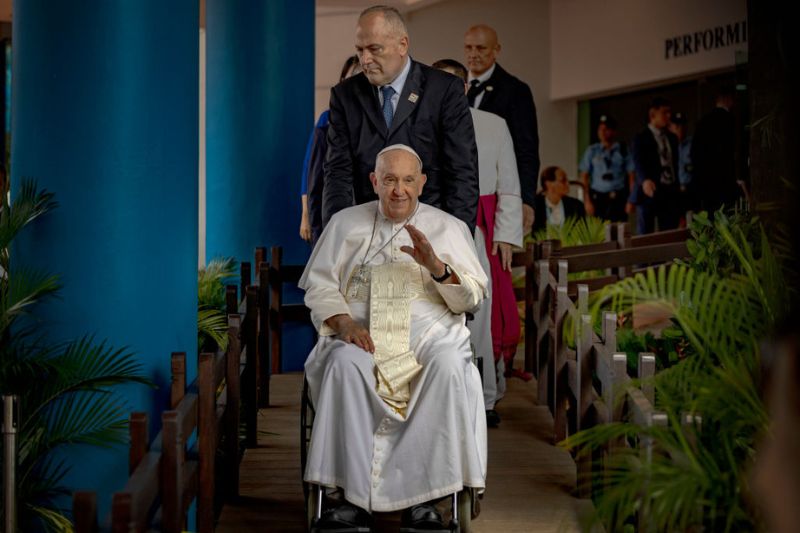Catholic voices and Catholic voters are inextricably linked, and Pope Francis is the most influential Catholic voice on the block. His pronouncements mean something to many Catholics, even if some others may choose to disregard them. During a recent interview on his Papal plane coming back from Singapore Francis made some pointed remarks in response to a veiled question from an American journalist about the US Presidential election contest between the Democrat Kamala Harris and the Republican Donald Trump. He chose to describe the choice as between the ‘lesser of two evils’ because Harris is pro-abortion rights and Trump is anti-immigration.

As Pope Francis put it, ‘They are both against life. The one who throws away the migrants as well as the one who kills children.’ Katie Herchenroeder, in Vanity Fair magazine, quoted him as saying: ‘To send migrants away, to leave them wherever you want, to leave them… It’s something terrible, there’s evil there. To send away a child from the womb of the mother is an assassination, because there is life. We must speak about these things clearly’.
Such statements are particularly controversial in US Catholic politics and some commentators regarded this one as an inappropriate intervention. It appears to disagree with the official position of the American Bishops in their 2024 election statement, ‘Forming Consciences for Faithful Citizenship’. Michael Sean Winters and Ellen Teague point out in The Tablet that the US bishops have repeated in 2024 their 2020 position that opposition to abortion is ‘our preeminent priority’. The Pope may, of course, have chosen to disagree with the American church statement to make a point, though he was at pains to state the obvious: he will not be voting.
Like all social groups, American Catholics are found on both sides of the presidential race. The reasons are a mix of socio-economic class, ethnicity and Catholic social teaching. Once Catholics were left leaning (as in Australia) and strongly Democrat. That was true when Democrat John Fitzgerald Kennedy was the first Catholic president 65 years ago but had ceased to be so by the time Democrat Joe Biden became the second Catholic president. Now White Catholics are predominantly pro-Republican and pro- Donald Trump and his Catholic running mate J.D. Vance. Black Catholics are predominantly pro-Democrat and pro-Harris. Latino Catholics are split.
The general global truth in Pope Francis’ statement is that modern Catholics don’t fit easily into major party politics given the breadth of official Catholic teaching. To vote or even more to stand for office for a political party is often to pick and choose among Catholic orthodoxy. This tension applies around the world and can make choosing between candidates difficult.
At the same time all Catholics are urged to take citizenship and voting as a sacred duty. As Pope Francis said in the same interview, ‘Not voting is ugly. It is not good. You must vote.’ In Australia compulsory voting (or at least compulsory attendance at the ballot box) means that non-voting is not a danger, but in the US and most other countries voting is optional.
Yet the ‘lesser of two evils’ approach, using church terminology, is not much of an encouragement for Catholics to vote. The choice sounds too bleak and may drown out the more positive messages from the church about the duties of citizenship. In that sense the Pope should be careful, even if his robust language is welcome compared to the bland offerings of many statements by bishops who seem afraid of upsetting some of their constituents.
'Abortion and immigration are important issues, but they are not the only ones despite their importance in church teaching, nor even, for many people, the main ones in elections. There are many more. The state of the economy, including the cost of living, poverty, and wealth distribution, is top of most voters’ priorities on both sides. Other serious contenders include climate change, health and welfare, and defence and security.'
In contrast the Catholic Bishops of England and Wales, reported in The Tablet, emphasise positives rather than negatives. I will return to this approach.
False equivalence can be a cop out too. But our priorities, given acceptance of genuine freedom of conscience for Catholics, are in the eye of the beholder. A great strength of the Pope’s statement is that he emphasises the freedom of Catholics to exercise their conscience.
I would make other caveats. Abortion and immigration are important issues, but they are not the only ones despite their importance in church teaching, nor even, for many people, the main ones in elections. There are many more. The state of the economy, including the cost of living, poverty, and wealth distribution, is top of most voters’ priorities on both sides. Other serious contenders include climate change, health and welfare, and defence and security. The Pope knows this, of course, but, led by the journalist, has chosen on this occasion to emphasise just these two issues.
Voters are also voting for persons to lead them as well as choosing between issues. The character and style of those leaders competing for our vote must rank highly. The Catholic Bishops of England and Wales have emphasised this positive approach in their election advice for the past thirty years. They say that: ‘The question must be: can an elector be confident that the person for whom he or she is voting is the best of those offering themselves…This consideration will discourage [choosing] solely on the basis of one policy issue, even where the attitudes of a candidate on such an issue are at variance with Catholic teaching.’
Surely in the current American context this should mean rejecting the character and style of Donald Trump. But we already know that many American Catholics, for their own reasons, will not.
John Warhurst is an Emeritus Professor of Political Science at the Australian National University.